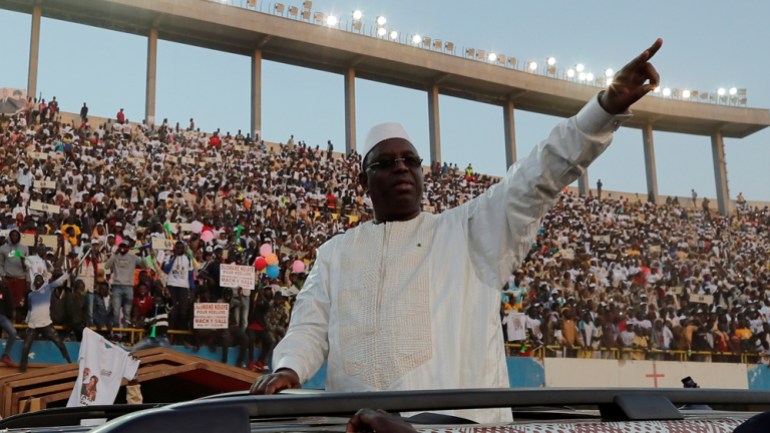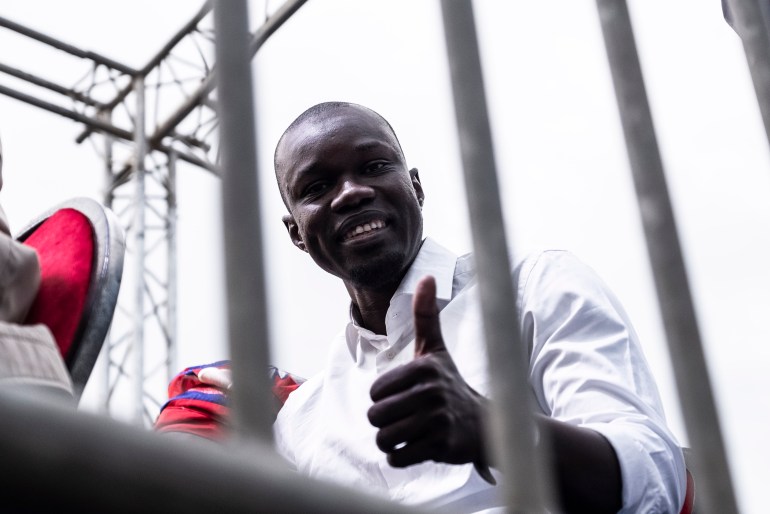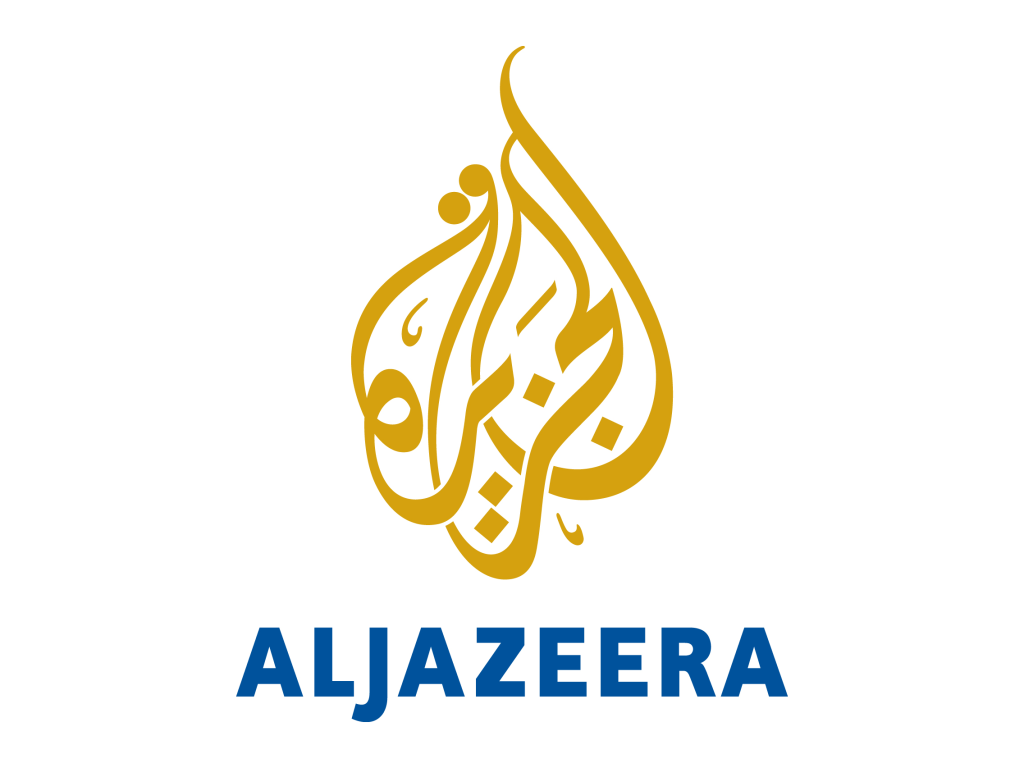ARTICLE AD
Last week, Senegal’s President Macky Sall unilaterally postponed presidential elections by several months just weeks before the planned date of February 25, sparking protests across a country already on edge from months of political tension. On Monday, the National Assembly descended into chaos as opposition members who tried to block a bill cementing the delay were arrested and policemen fired tear gas at protesters gathered outside.
Sall, who will end a two-term tenure on April 2, and who has stated that he would not run for a third term, said the postponement was necessary because of a dispute over the list of approved candidates for the elections. This is the first time polls have been postponed in the country. There is speculation that he has delayed the elections because he is not confident about the popularity of Prime Minister Amadou Ba, the candidate for Sall’s Benno Bokk Yakaar (BBY) coalition, who has been approved by the Constitutional Council. Ba’s office has not commented on the crisis.
Many Senegalese are unhappy with the postponement and believe Sall, who has been in office since 2012 and is no longer eligible to run himself, is trying to hold onto power for longer. Opposition parties have launched a legal challenge to reverse the delay.
Scores gathered to protest in the capital Dakar after Sall announced the shift, but they were forcefully dispersed by the police.
Here’s why voters in Senegal are sceptical, and what the delay means for the country.
 Senegal’s president and candidate Macky Sall greets supporters as he arrives to attend a rally in Dakar in his second and final election on February 22, 2019. Sall, who is not eligible to run again, delayed the scheduled February 25, 2024 elections on a technicality [Zohra Bensemra/Reuters]
Senegal’s president and candidate Macky Sall greets supporters as he arrives to attend a rally in Dakar in his second and final election on February 22, 2019. Sall, who is not eligible to run again, delayed the scheduled February 25, 2024 elections on a technicality [Zohra Bensemra/Reuters]
Why was the vote postponed?
On February 3, after rumours appeared on Senegalese social media about a possible postponement, Sall announced in a televised speech that elections slated for February 25 would indeed be postponed.
The official campaign season was scheduled to kick off the next day – set to last from February 4 until the elections on February 25.
In his statement on Saturday, Sall said he would work to address issues that had arisen when a handful of prominent candidates were disqualified by the country’s Constitutional Council for not meeting set criteria. Questions around whether the council was discriminatory in their selection prompted lawmakers to launch a probe into the accreditation process in January.
Among those candidates who have been excluded is Karim Wade, a former minister and the son of former President Abdoulaye Wade, who was disqualified for having dual French and Senegalese citizenship – against the rules for candidates. Wade has lived in Qatar since 2016, when he was released from prison on a presidential pardon from Sall. He was serving a six-year term for corruption and has not attempted to return to the country since then.
Earlier, Wade’s opposition Senegalese Democratic Party (PDS), submitted a formal request to postpone the election.
Another popular candidate who has been excluded is Ousmane Sonko, arguably Sall’s greatest challenger. Sonko, who placed third in the 2019 elections and who has been the cause of much political tension in the past three years, was disqualified for having a criminal record after he was imprisoned on charges of “corrupting minors and inciting insurrection” in 2023. Sonko is still in detention.
Sall said he had signed a decree to annul the rules that require elections to be held after five years. Questions about whether the Constitution of Senegal allows for a president to effectively remove requirements to hold an election through a decree have arisen, but have not been clarified.
Sall also announced that he would instigate a “national dialogue” and take “reconciliation” measures to resolve the issues within the council without specifying what those steps would be.
“These troubled conditions could seriously undermine the credibility of the ballot by sowing the seeds of pre- and post-electoral disputes,” he said in the live address, adding again that he has no plans to run for a third term.
Does the president have the power to delay an election?
While some experts say the president does not have powers to postpone elections, Oumar Ba, a political scientist at Cornell University in the United States, said Sall’s changes do fall within the framework of existing policies.
“Note that he issued a decree that annulled the previous decree that had called on the voters to the polls on 25 February,” Ba said, adding that the actual postponement, as the president made clear in his address, was initiated by an opposition party within the National Assembly and consecrated by a vote there.
“To me, it is important to not lose sight of this institutional framework within which the moving parts of the crisis are operating. This, however, also shows that Sall’s claim that it is an institutional crisis that warrants the postponement is dubious. All the institutions seem to be operating as they were intended, so there is no institutional crisis.”
 Opposition candidate Ousmane Sonko is extremely popular with young people in Senegal. He has been imprisoned on charges of “corrupting youth” and remains in detention [Xaume Olleros/Getty Images]
Opposition candidate Ousmane Sonko is extremely popular with young people in Senegal. He has been imprisoned on charges of “corrupting youth” and remains in detention [Xaume Olleros/Getty Images]
How have voters reacted?
Sall’s announcement has not gone down well with the Senegalese public.
Tensions have been brewing in the country since December 2020, when the president made a comment that seemed to suggest he would run for a third term, which is not allowed under the constitution. Sall’s supporters argued at the time that a review of the constitution (which changed the presidential term from seven to five years) had “reset” his terms. The president was first elected in 2012 for seven years, and again in 2019 – this time for five years.
Although Sall stated in an interview in July 2023 that he was not going to run, wide distrust lingered because he had been seen as cracking down hard on the opposition in recent years.
In March 2021, deadly riots broke out after Sonko, who is highly popular with Senegalese youth, was arrested over allegations that he had raped a female massage parlour worker. He also faced a host of legal challenges at the time, including that he had defamed and “insulted” another politician. His supporters believe the cases are politically motivated and that Sonko is not guilty of any of the allegations.
Hundreds of Sonko supporters took to the streets after his arrest in March. Some 13 people died during three days of countrywide riots as the police cracked down with live ammunition. The Senegalese government also shut down access to the internet during the violence.
Sonko, who is also mayor of the southern city of Ziguinchor, was eventually acquitted of the rape charges in June 2023, but was sentenced to two years in jail for “corrupting minors”, which is a lesser misdemeanour charge. He currently remains in detention. Sonko’s party, African Patriots of Senegal for Work, Ethics and Fraternity (PASTEF), has been dissolved, and he was planning to run as an independent candidate in these elections.
The conviction led to his removal from the elections list, but Sonko’s lawyers challenged the decision, leading to the Supreme Court declaring him eligible to run in December 2023. However, the electoral college has not reinstated him on a list of 20 approved candidates. The council said on January 5 that Sonko, in his application, did not submit proof of funds worth nearly $50,000, which is one of the requirements. Sonko’s legal team had previously told reporters that government institutions were frustrating their attempts to obtain all the necessary documents.
What was the opposition’s reaction to Sall’s announcement?
On Monday, February 5, after Sall’s weekend statement postponing the elections, the National Assembly passed a bill that set a new election date of December 15, cementing the president’s decision. The bill was backed by 105 of 165 assembly members.
Some opposition lawmakers were forcefully removed from the house during the debate over the bill and voting turned to chaos as some members physically tried to block the proceedings.
One opposition leader told Reuters that three opposition lawmakers were arrested. One of them, Guy Marius Sagna, was among those who tried to stop the vote in the assembly by blocking the dais. Most of the lawmakers who voted in favour of the bill were from the ruling Benno Bokk Yakaar (BBY) coalition. Opposition groups claimed the bill only serves to extend Sall’s stay in office.
Outside the National Assembly building in Dakar, scores of protesters and opposition supporters gathered to protest against the bill as the debate unfolded. Senegalese police fired tear gas to disperse them.
Two opposition parties have filed court petitions to challenge the delay to the elections.
Countries and international institutions have expressed concern. Senegal holds the rare position of being one of few countries that have never had a military coup in Africa – certainly the only one in West Africa, aside from Cape Verde. However, the recent violence, as well as Sall’s weekend announcement, is souring its reputation, as opposition candidates have equated his move to a forceful takeover of power.
On Tuesday, the US Department of State said the postponement ran “contrary to Senegal’s strong democratic tradition”.
The Economic Community of West African States (ECOWAS) did not directly refer to the new election date in a statement on Monday, but suggested that the postponement may be unconstitutional. The regional economic bloc is in a bind, following the exit of three military-led countries from its folds: Mali, Niger, and Burkina Faso.
“The ECOWAS Commission encourages the political class to urgently take the necessary measures to re-establish the electoral calendar in accordance with the provisions of the constitution,” the bloc said in the statement.
The African Union also issued a statement raising concerns about the delay to the elections. It said the elections should be held as soon as possible and ”in transparency, peace and national harmony”.
What will happen next?
Calm has returned to the streets of Dakar for the time being as voters wait to see what Sall’s proposed reforms to the Constitutional Council and the electoral system will be. On Senegalese social media, there are calls for massive protests, but there is still a visible police presence to deter gatherings.
In a statement on Wednesday, Sall’s office said the Ministry of Justice should “pacify the public space” in reference to the disruptions his Saturday announcement caused.
The Senegalese telecommunications agency announced that it would restrict mobile internet late on Monday after the parliamentary vote, but services have since been restored. A private television station, Walf TV, was taken off air for “inciting violence”, according to the authorities.
Although the president re-iterated – again – that he would not run for office in his Saturday speech, opposition groups reject his claims that he is working in the interests of the country.
“We feel this is a constitutional coup,” Yassine Fall, the now-dissolved PASTEF’s vice president, told Al Jazeera.
“Macky Sall is not doing this for us, he is doing this against us. [He] understands that if we go to elections, we will win by a landslide victory, but he wants to stay in power or have someone from his party to be elected.”
Sall has not made any new announcements on the measures he’ll take to reform the Constitutional Council. Some experts say it is likely he will dissolve the unit and form a new one, a process that could prove lengthy. Ba, the Cornell professor, said many in the country are uncertain.
“We don’t even know what will happen on April 2, when Sall’s term effectively ends,” he said. “Will he stay on? If he does, will he form a coalition or transitional government which will include some opposition figures? This is unchartered territory for the Senegalese nation.”

 11 months ago
65
11 months ago
65 
